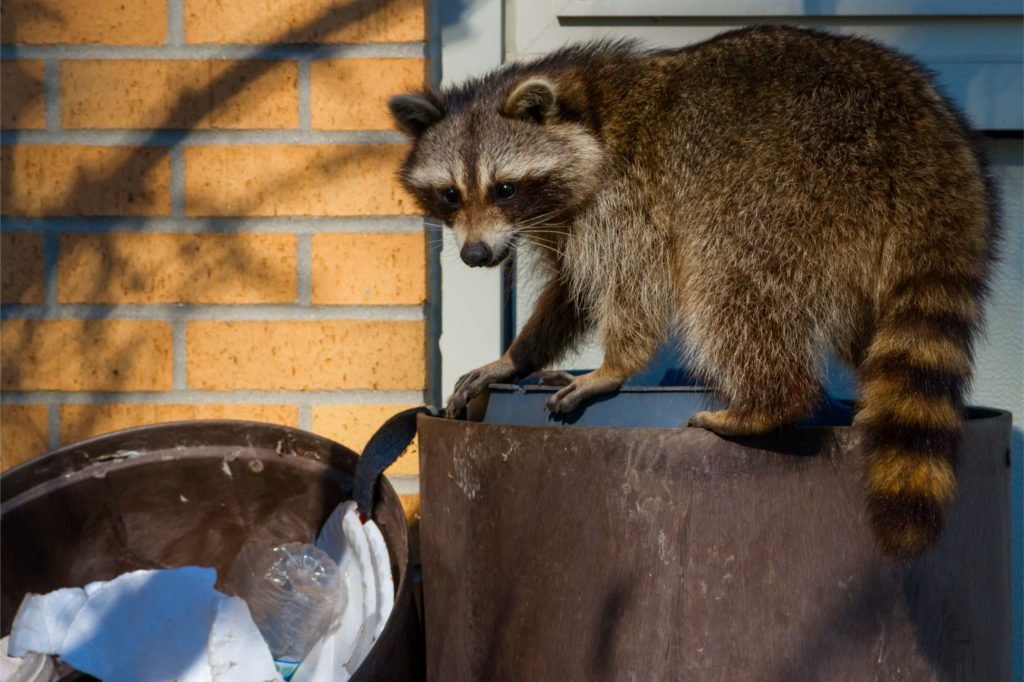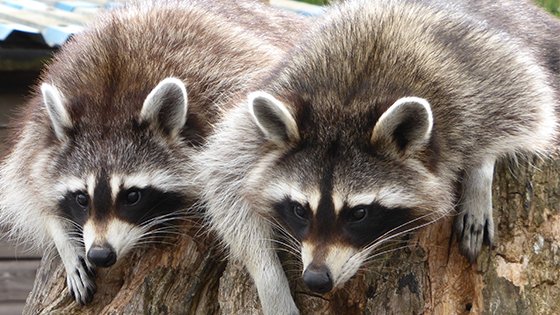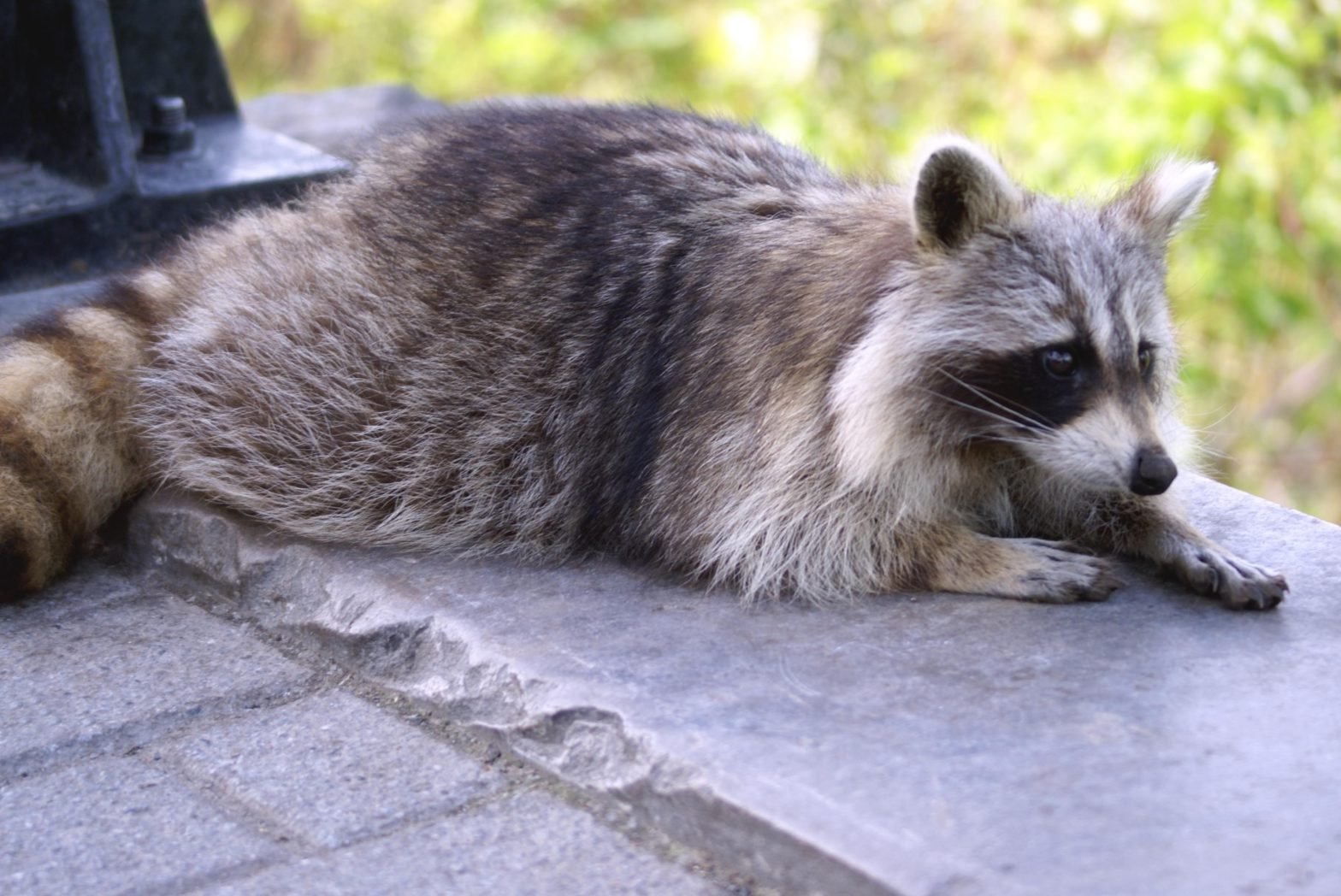Are you tired of playing cat and mouse with raccoons in your home? Say goodbye to those pesky critters and protect your property with effective raccoon prevention and exclusion methods.
Learn from the experts how to identify vulnerable entry points, implement physical barriers, and apply natural deterrents to keep raccoons at bay. The professional service technicians at Wildlife Pro, the trusted leader in raccoon removal services, can help you safely and efficiently eliminate your raccoon problem.
Take control of your home and bid farewell to raccoons for good.
Understanding Raccoon Behaviour
Understanding raccoon behaviour is important in preventing them from causing property damage and posing health risks to you and your family. You may have seen how raccoons use their intelligence and resourcefulness to adapt to various environments. They’re nocturnal, meaning they’re most active during the night. Raccoons are known for their dexterity and ability to climb, using their sharp claws to scale fences, trees, and even buildings.
They’re also skilled scavengers and will rummage through trash cans in search of food. Raccoons can be territorial and may mark their territory with urine or feces. Understanding these behaviours can help you take the necessary steps to prevent raccoons from entering your property.
By partnering with Wildlife Pro, you can ensure effective raccoon removal, exclusion, and prevention. We offer reliable and knowledgeable services, with a special discount of an additional 10% off of our usual affordable rates during November and December this year. We are also extending our highly regarded 12-month warranty to 18 months as an added bonus when you book us for service.
Don’t let raccoons cause damage to your property or put your family’s health at risk.

Identifying Vulnerable Entry Points
To protect your property, take a moment to evaluate potential entry points where raccoons may gain access. Raccoons can find their way into your home through even the smallest of openings. Start by inspecting your roof for loose or damaged shingles, as raccoons can tear them apart to create entry points.
Check your attic vents and chimney for any gaps or holes that need to be sealed. Raccoons can also enter through crawl spaces and basements, so make sure to secure those areas as well.
It’s important to remember that raccoons have sharp claws and dexterous paws that enable them to cause damage. By identifying and addressing these vulnerable entry points, you can minimize the risk of raccoon infestations and protect your property from potential damage.
If you do see signs of raccoon entry, don’t get too close to them. Raccoons carry diseases that may be harmful to humans, so steer clear of them if you do sense their presence. Be cautious around their feces as well, because they contain toxins that are dangerous for people and pets. Leave raccoon removal to the experts at Wildlife Pro,who have experience dealing with these animal pests.
Implementing Physical Barriers
By installing sturdy fencing and sealing off potential entry points, you can effectively prevent raccoons from gaining access to your property. To ensure that your property remains raccoon-free, it’s crucial to implement physical barriers that are strong and secure.
Wildlife Pro can help by sealing off any potential entry points, such as gaps in your walls, windows, or doors. A raccoon’s body is such that it can flatten out to access entry points that are seemingly too narrow to navigate. There have been cases of raccoons entering locked sheds by slipping in between the top of the closed doors and the door frames!

Applying Natural Deterrents
If you want to deter raccoons naturally, you can consider:
- using strong-smelling substances like ammonia or predator urine around your property. These scents can be effective in repelling raccoons, as they’re sensitive to smells.
- placing soaked rags or cotton balls with these substances in areas where raccoons are likely to enter, such as near trash cans or in your garden. Additionally, you can use motion-activated sprinklers or lights to startle and discourage raccoons from approaching your property.
- keeping your yard clean and free of food sources, such as fallen fruit or bird feeders, as these can also attract raccoons.
Note that while these deterrents are sometimes helpful to deter raccoons from being attracted to your property, they do nothing to remove raccoons that may already be residing at your home.
Wildlife Pro’s Service and Warranty
You can rely on Wildlife Pro for exceptional service and warranty when it comes to raccoon removal, exclusion, and prevention. With our extensive knowledge and experience in dealing with raccoon infestations, Wildlife Pro ensures that you receive the best possible service.
November/December Specials
We are offering a special discount of an additional 10% off of our usual affordable rates during November and December this year. We will also extend our 12-month warranty to 18 months as a bonus when you book us for service.
Our team of professionals is well-versed in identifying and removing raccoons based on their sounds, which include scratching, thumping, chirping, growling, and hissing. Of note are the signs of raccoon habitation to watch out for, which can include:
Frequent sightings: One of the most obvious signs of raccoon habitation is the regular presence of raccoons in your vicinity, especially during the daytime, as they are primarily nocturnal animals.
Footprints: Raccoon footprints are easy to identify thanks to their distinctive paw prints. Their tracks usually have five toes and are similar to small human handprints.
Damage to structures: Raccoons are known for their ability to cause damage to buildings and structures. Look for signs of broken roof tiles, ripped shingles, torn vent covers, or damaged fascia boards, as these can indicate raccoon activity.
Feces: Raccoon droppings, known as scat, can be found near their den or in areas they frequently visit. Their feces are tubular in shape, 2-3 inches long, and usually dark in colour.
Garbage disturbance: Raccoons are notorious for rummaging through garbage cans in search of food. If you find trash scattered around your property, with torn bags or overturned bins, it may indicate raccoon activity.
Evidence of foraging: Raccoons are omnivorous and will eat a variety of foods. Look for signs of digging or overturned soil in your garden, damage to crops or plants, or evidence of raccoons raiding bird feeders.
Nests or dens: Raccoons typically create dens in secluded areas like attics, crawl spaces, chimneys, or hollow trees. Look for signs of nesting materials, such as leaves, grass, or shredded insulation, in these areas.
Pet food disappearance: Raccoons are opportunistic feeders and may steal pet food left outside. If your pet’s food bowl is constantly empty or you find food missing, it could be a sign of raccoon activity.
If you suspect raccoon habitation on your property, it is recommended to contact Wildlife Pro immediately. When it comes to raccoon removal, Wildlife Pro prioritizes safety and uses humane methods to protect both you and the raccoons. We can lessen the health risks connected with raccoon infestations while also preventing extensive property damage from raccoons.
Wildlife Pro is dedicated to providing reliable and efficient raccoon removal assistance, ensuring your peace of mind. Don’t let raccoons disrupt your peace of mind any longer—trust Wildlife Pro for efficient and effective exclusion and prevention services.

